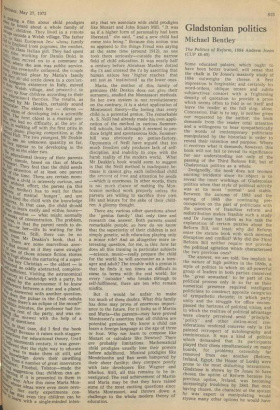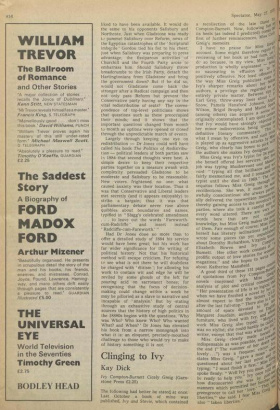Gladstonian politics
Michael Bentley
The Politics of Reform, 1884 Andrew Jones (CUP £6.40) Some educated palates, which ought to have been better trained, will sense that the chalk in Dr Jones's masterly study of 1884 outweighs the cheese. A first impression is forgivable; and certainly his word-orders, oblique tenses and subtle subjunctives consort with a frightening density of quotation to provide a prose which seems often to fold in on itself and leave the reader at the full stop, alone. Concession, that is to say, is neither given nor requested by the author; the book demands from the reader total attention and a willingness to hear sympathetically the words of contemporary politicians manipulated by the historian in order to reveal their intention and purpose. Where it receives what it demands, however, this book will not fail to reveal its significance for our understanding not only of the passing of the Third Reform Bill, but of Gladstonian politics as a whole.
Designedly, the book does not recount exciting incidents since its object is to reveal the inner workings of Gladstonian politics when that style of political activity was at its most 'normal' and stable. Between the autumn of 1883 and the spring of 1885 the continuing preoccupation on the part of politicians with the question of franchise reform and redistribution makes feasible such a study and Dr Jones has taken as his task the explanation of certain puzzles about the Reform Bill, not least: why did Reform enter the statute book with such minimal disruption and conflict? Why did the Third Reform Bill neither require nor provoke the political agitation which characterised the two previous ones?
The answer, we are told, lies implicit in the nature of high politics in the 1880s, a style of politics in which an all-powerful group of leaders in both parties conceived the great unwashed' to be part of the political process only in so far as their numerical presence required intelligent politicians to construct apposite categories of sympathetic rhetoric; in which party unity and the struggle for office encompassed the horizons of political vision; and in which the realities of political advantage were clearly perceived amid principle,' 'policy' and other cotton-wool considerations rendered concrete only in the painted retrospect of autobiography and reminiscence. It was a kind of politics which demanded that its participants played their chess simultaneously on many boards, for problems ostensibly far removed from one another (Reform, Ireland, Egypt, the House of Lords) were prone to the most disturbing interactions. Gladstone is shown by Dr Jones to have chosen the option of Reform because his previous option, Ireland, was becoming increasingly troublous by 1883. But once having chosen, the character of the system he was expert in manipulating would stymie many other options he would have
liked to have been available. It would do the same to his opponents Salisbury and Northcote. Just when Gladstone was ready to pummel Salisbury over Reform, news of the Egyptian catastrophes of the ' Scriptural imbecile ' Gordon tied his fist to his chest; just when Salisbury was preparing to press advantage, the fissiparous activities of Churchill and the Fourth Party arose to embarrass him. Should Salisbury throw breadcrumbs to the Irish Party, detach the Hartingtonians from Gladstone and bring the government down? But if he did so, would not Gladstone come back the stronger after a Radical campaign and then not only pass Reform but prevent the Conservative party having any say in the vital redistribution of seats? The correspondence of top-level politicians shows that questions such as these preoccupied their minds; and it shows that the important questions changed from month to month as options were opened or closed through the unpredictable march of events.
Largely through keeping one eye on redistribution — Dr Jones could well have called his book The Politics of Redistribution — political leaders of both parties saw in 1884 that second thoughts were best. A simple desire to keep their respective parties together on a measure awash with complexity persuaded Gladstone to be moderate and Salisbury to be reasonable. New voters frightened no one: what caused anxiety was their location. Thus it was that Conservative and Liberal leaders met secretly (and it appears enjoyably) to strike a bargain; thus it was that parliamentary debate never rose above quibbles about boundaries and names, typified in " Slagg's celebrated amendment . . to leave out the words ' Farnworth cum-Radcliffe ' and insert instead Radcliffe-cum-Farnworth.' " Had Dr Jones done no more than to offer a detailed study of 1884 his service would have been great; but his work has far wider significance for the writing of political history. Not that his historical method will escape criticism. For refusing to see what is not there he will doubtless be charged with ' elitism'; for allowing his work to contain wit and edge he will be reviled by some ghouls of the left for pouring acid on sacrosanct bones; for recognising that the focus of decisionmaking could change within a week he may be pilloried, as a slave to narrative and incapable of ' analysis.' But by •stating through an exhaustive study of central sources that the history of high politics in the 18880s begins with the questions, 'Who was Who? Who knew Who? Who wanted What? and When?' Dr Jones has elevated his book from a narrow monograph into what it is: an eloquent, precisely-mouthed challenge to those who would try to make of history something it is not.











































 Previous page
Previous page